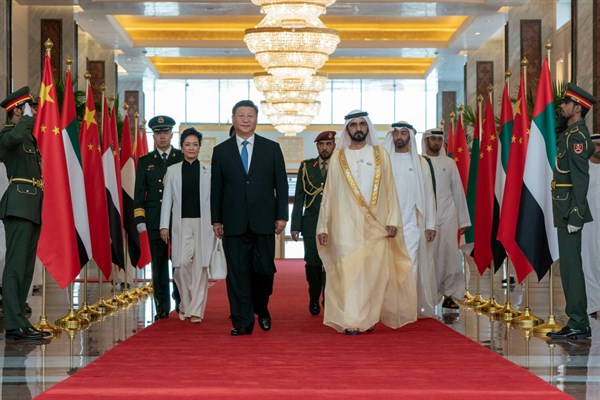As dusk fell in Abu Dhabi on July 20, the LED screen affixed to the face of the 65-story headquarters of the emirate’s national oil company presented a peculiar sight: a photograph of Chinese President Xi Jinping stretching over 1,000 feet high, looming over the Persian Gulf. In nearby Dubai, the Burj Khalifa, the world’s tallest skyscraper, was lit from top to bottom in the colors of the Chinese flag. Even by the standards of a country with little use for subtlety, the United Arab Emirates went all out to mark Xi’s state visit.
At a time when China seems poised to take on a more assertive role in the Middle East, such pageantry seems fitting. The Chinese government has been rolling out new agreements and commitments under the auspices of its sprawling international infrastructure initiative, known as One Belt, One Road, which is certain to have a profound geopolitical impact in the region. Xi’s trip to Abu Dhabi came just a week after he hosted the eighth ministerial meeting of the China-Arab States Cooperation Forum in Beijing, where he pledged $20 billion in development loans to Arab countries.
Less heralded, though just as consequential, was the Chinese government’s promise to divide $105 million in direct aid among Jordan, Lebanon, the Palestinian Authority, Yemen and Syria. The Jordanian government, facing a political crisis that has triggered mass popular demonstrations, is eager for any appearance of foreign support. Lebanon, which hosts a large number of refugees from neighboring Syria, is a perennial tinderbox. The aid to Palestinians underscores China’s status as the global power most eager to still press for a two-state solution with Israel, a goal Xi reiterated to Arab leaders in Beijing. And Yemen and Syria, racked by civil wars, are in dire need of humanitarian assistance.

